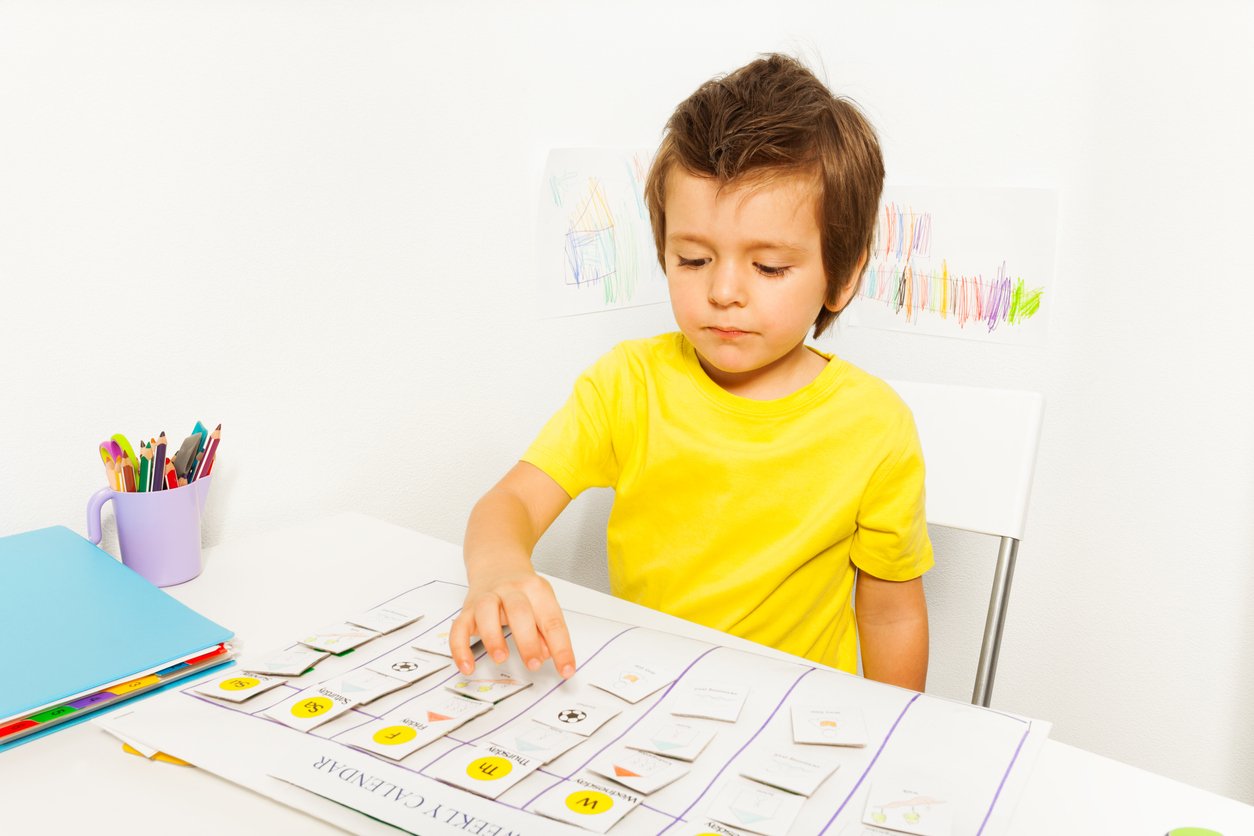Best Free Resources for Homeschooling Your Autistic Child
If you are a family that has chosen to homeschool your autistic child, here is a list of fun, free resources and subscriptions to engage your child and support their learning from home.
STAGES® Learning offers free autism resources for downloading, printing, and immediate use that will enrich your child’s social/emotional and behavioral development.
Organization and Maintaining Routine
-
Bridging Apps:
Bridging Apps offers an array of apps for autism that can help home-schooling parents with organization, keeping track of behavior notes, nutritional information, schedules, interventions, and more. The apps on this site focus on and have been designed to address particular needs or have been creatively adapted by users to meet specific needs. Some educationally focused apps include suggestions for matching apps to educational goals. When new to homeschooling and creating daily norms and routines, these apps may be especially helpful in maintaining balance in the lives of autistic children. The apps are free to download.
-
DayCape:
The DayCape app offers autistic children visual structure in their daily routines. It has a simple display with images, a visual timer, and what tasks need to be done during the day. Based on research about autistic children, the app includes visuals, color coding, data tracking, opportunities for adaptation, and Moodshare, which helps children communicate how they feel about the activity. The app, which supports routine and self-regulation, is free to download.

Educational
-
123Homeschool4me:
123Homeschool4me offers a vast collection of free downloadable worksheets for grades PreK-junior high. The website is organized by grade level and offers activities focusing on all school subjects. Finding worksheets and activities similar to those children complete in school can help create a routine. The worksheets and activities offered are fun and creative! -
A2ZHomeschooling:
A2ZHomeschooling offers a blog specifically focused on homeschooling autistic children. The website includes ideas and tips that can be used with any curriculum on any budget, focusing especially on how to assess students from home and accommodate ritual and perfectionist tendencies. They have created a Pinterest board filled with activity ideas and designing a place that is suitable for learning: https://www.pinterest.com/kattkreations/homeschooling-autistic-children/ A2ZHomeschooling is free to navigate and includes links to free downloadable resources. -
Acessibyte:
Acessibyte is an app created specifically for students who are blind, visually impaired, deaf, or have learning differences and need practice typing, studying, or general homework help. For autistic children, Acessibyte’s text-to-voice, magnification, and visual settings can support students who may require additional visual support. -
Autism Classroom:
Autism Classroom is a website created specifically for parents and educators of autistic children. They offer free teaching materials and tips on setting up a home classroom space and creating a productive learning environment. Autism Classroom provides several free downloadable materials on its website and its Teachers Pay Teachers Store. -
PBS KIDS:
The PBS KIDS website, with activities for ages 2-8, offers ideas that will help enhance your child’s social-emotional, literacy, math, science, and arts skills. You can choose between crafts, experiments, recipes, apps, and more. You can also refine your search by favorite T.V. show characters! PBS KIDS’ graphic presentations may especially appeal to autistic children. Sign up for PBS KIDS’ weekday newsletters for activity ideas and check out PBS KIDS For Parents where you can search for activities by age, topic, PBS KIDS shows, and activity type. -
TeachTown:
TeachTown Basics provides an ABA-based curriculum that addresses the academic, cognitive, and social/emotional challenges faced by autistic students. TeachTown offers a play-based curriculum that fosters imagination, engagement, and movement. -
Regis College:
What is Autism Spectrum Disorder and What Should Parents and Educators Know?
Language Arts
-
Beeline Reader:
Beeline Reader is a browser extension that focuses on improving the reading abilities of students of all ages and skill levels. Beeline displays text using color gradients that support visual tracking and allow readers to focus more on other aspects of reading, such as decoding and comprehension. Independent research by educators and literacy nonprofits shows that BeeLine Reader provides strong benefits for readers across general education and special education. -
Dog on a Log Books:
Dog on a Log Books was designed by a mother who homeschools her child with dyslexia. The website offers decodable books for struggling readers with fun characters and additional printable games and activities to support reading comprehension. The visual and scaffolded nature of Dog on a Log Books may especially support the learning of autistic children. Dog on a Log is free and has a collection of downloadable books to enjoy. - Dreamscape:
Dreamscape is an interactive video game app that combines strategy and imagination to support literacy instruction for students in grade levels 2-8. Dreamscape focuses on 100 high-frequency words that account for 50% of the words found in text. Using this resource to help support your autistic child's fluency with high-frequency words will help them to be a stronger reader. Download for free on Google Play or in the Apple App Store.

Math
-
Ascend Math:
Ascend Math offers individualized math instruction for students. Fill in a form about your child’s learning habits and Ascend Math will develop a study path that identifies and focuses on gaps in your child’s learning. They offer Special Education, ELL, and alternative learning models as well! For autistic children, Ascend Math’s individualized approach to conceptual objectives, motivating reinforcements, and progress monitoring help to maintain a sense of regularity and provide important support. -
Bedtime Math:
Bedtime Math offers a collection of non-screen math learning for homeschooled students as well as an app to explore! Bedtime math caters to learners ages 4-9 and includes printables, books, crafts, and movement activities for students to practice their math facts. Each “Daily Math” problem is presented in different ways to appeal to different learners. For autistic children, BedTime Math’s differentiated approach appeals to all levels of learners! Bedtime Math is free. -
DreamBox Learning:
Dreambox Learning offers math lessons for students in grade levels K-8. Students can set a weekly goal and “level up” as they make progress in learning. Student progress is monitored and data collected, creating personalized interventions to suit student needs. The personalized approach and goal-oriented learning can be customized to reflect the educational goals of an autistic child.
Science
-
Backpack Sciences:
Backpack Sciences offers videos of hands-on science lessons for elementary school students. Included are videos for parents who are homeschooling their children on how to present the lessons and helpful tips. For autistic children, lessons are scaffolded by learning level (higher complex concepts are presented in a different font color), so learning can be catered specifically to your child. Backpack Sciences videos are free. -
Biology Simulations:
Biology Simulations offers virtual lab simulations for students to explore. Topics include biology, evolution, ecology, and cells. For autistic children, the graphic, hands-on nature of this activity may be appealing. Additionally, Biology Simulations has a blog with resources available to differentiate learning for all students. Biology Simulations is free to use. -
Club SciKidz:
Club SciKidz offers daily cooking or science activities to do at home. Activities are suitable for all ages and ability levels. A wide range of topics are explored and previous activities can be found in their blog. Each daily activity comes with a written explanation, numbered steps, and videos from different creators to support the learning of your autistic child. Sign up for free with your email.

Social Studies
-
ActiveHistory:
ActiveHistory offers a collection of interactive simulations, decision-making games, quizzes, worksheets, and lesson plans for students grade levels 5-12. Students have the opportunity to explore interactive online computer simulations of periods in history and learn at their own pace. ActiveHistory provides a multimedia approach, including reading, podcasts, music, and TED Talks to support exploration. For autistic children, the hands-on self-guided approach may benefit those who enjoy studying topics in-depth, with a wealth of resources to support them. -
National Geographic Kids:
National Geographic Kids offers grade-level games, videos, and downloadable activities for kids to peruse. The website covers a wide range of topics about the world around us and invites kids to explore. In addition to fun, educational videos, and games, National Geographic Kids also offers “Homework Help” to support learning. For autistic kids, their interactive maps, glossaries, and study tips can be used to create an individualized learning opportunity. National Geographic Kids is free to use. -
Wonderopolis:
Wonderopolis offers a collection of content for grades K-12 that aligns with Common Core State Standards. Every day, Wonderopolis poses a “Wonder of the Day” question covering a vast range of topics. There are a vast number of articles and videos to explore, and kids can write in to have their own “wonders” answered! Each question and comment submitted to Wonderopolis receives a personal response. For autistic homeschooled children who may have very specific interests, Wonderopolis is a wonderful resource to explore their ideas. Wonderopolis is a free resource.
Arts, Exploration, Social-Emotional Learning, and Movement
-
Art Projects for Kids:
Art Projects for Kids offers free, fun, and unique art projects. The detailed, scaffolded, “how-to-draw” lessons offer a clear, numbered approach for autistic children to follow and enjoy. Art Projects for Kids offers free projects on their Daily Blog. -
Fluency & Fitness:
Fluency & Fitness helps students review essential K-2 reading and math skills while incorporating movement breaks. There are over 900 videos and 365 skills to choose from! You can choose the pacing of the video based on your child’s skill level while enjoying movement, animation, and music at the same time. For autistic children, studies have shown that movement-based therapies boost social skills, communication abilities, attention, and behavior. Incorporating movement into learning is an opportunity to support learning and get some energy out. -
GoNoodle:
GoNoodle is a website of videos, games, and music for children to engage and interact with. Their content is created by a team of child development experts, choreographers, mindfulness experts, and developers who specialize in kid content. GoNoodle is a great resource for autistic children because it provides a multisensory approach to learning through movement and supports children with sensory sensitivities. GoNoodle is free to use. -
Little Twisters Yoga & Emotional Wellness:
Little Twisters Yoga & Emotional Wellness offers videos and visual printables of yoga poses and routines inspired by nature and animals for children ages 2+. Little Twisters Yoga provides research-based information that explains how creating a multi-sensory environment that appeals to various learning styles (visual, auditory, kinesthetic, etc.) stimulates both the Left and Right side of the brain, enhancing comprehension and retention. -
METKids:
METKids offers a catalog of historical collections ranging from 8000 BC to the present time. Kids can explore art and culture in specific periods, enjoy videos, and take a virtual tour of the museum. The MET mission statement outlines their devotion to connecting all people to creativity, knowledge, and ideas. For autistic children, the differentiated ways that information is provided on the website allow opportunities for individualized learning. METKids is free to access. -
Minecraft Education Edition:
Minecraft is a game-based learning platform that promotes immersive STEM learning, creativity, and innovation. Explore a vast collection of coding, math, geography, and science topics through gaming! Minecraft also has multiplayer simulations, where students can collaborate in their Minecraft worlds, building, planning, learning, and chatting. For autistic children, using an augmentative communication program supports the practice of social communication skills. The education version of Minecraft is free. -
Pathway 2 Success:
Pathway 2 Success was created by a special education teacher with a specialization in autism. Her blog is created for autistic students, focusing on social-emotional learning, behavior management, coping strategies, mindfulness, and social skills. Each of these topics can be explored in depth with available resources. Pathway 2 Success is free to navigate with free downloadable materials. -
Slumberkins Caregiver Resources:
Free educational videos, coloring books, affirmation exercises, and more activities to emphasize social-emotional learning in young children.






